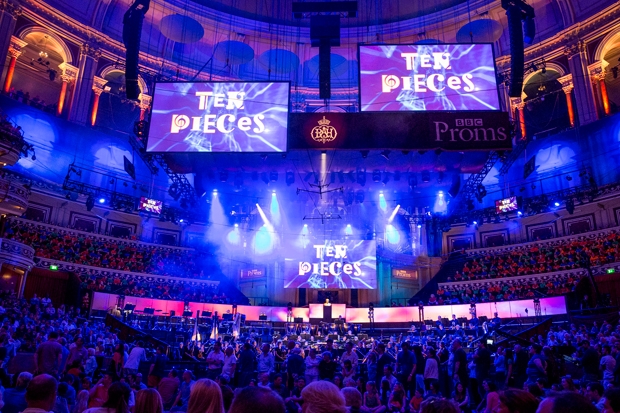There’s nothing quite like a First Night — and last Friday we launched the Proms, the most celebrated classical music festival in the world, now in its 120th year. There’s the thrill of walking into the Royal Albert Hall for the first time; taking your seat with thousands of other music fans; the ‘heave ho’ chant from the Prommers; the quiet before the music begins. It’s a vast space, but it can also feel very intimate. So it was perfect for the opening concert with moments of quiet reflection in works by Mozart and Sibelius, as well as great walls of sound in Walton’s Belshazzar’s Feast. With almost 300 players and singers on stage — the BBC Symphony Orchestra, Singers, Symphony Chorus and the BBC National Chorus of Wales, all superbly directed by Sakari Oramo — it was just breathtaking. Speaking to Sakari afterwards, he was rightly exhausted, but elated.
It was an opening weekend like no other, with the Royal Albert Hall overrun with trolls, witches, and an awful lot of children — more than 600 on stage across two performances of our Ten Pieces Prom, and thousands more in the audience. This was the culmination of year one of a project we’re doing to bring classical music to every primary-school child in the country. The children had been inspired to produce their own music, art and dance — and, by the end, there wasn’t a dry eye in the house.
I love walking, and, rather like needing a fix of good writing before bed, I need a walk every day. But the gadget on my wrist has changed this into an obsession. My Jawbone fitness tracker tells me I need to cover 10,000 paces a day. So now I walk everywhere. I’ve done some meetings on the trot, and to demonstrate that I really am becoming a pace-nerd, I’ve even done turns around the town I live in, late at night, to hit the magic number. Mad? Possibly, but this is one case of technology genuinely transforming my too-sedentary life.
The other day we unveiled one of my favourite projects: the BBC micro:bit, launched 30 years after the original BBC Micro computer. It’s a tiny computer that fits in the palm of your hand. I’m now the proud owner of one of the first to come off the production line. We’ll be giving one to every 11- and 12-year-old child in Year 7 this autumn, working with schools and teachers across the country. It’s a collaborative adventure we’ve developed with 28 partners, including Arm, Microsoft, Samsung and Barclays. It has the power to change the way children think about their ability to make things happen — digitally. They’ll be able to code their micro:bits to create text, pictures and games across 25 LEDs. There’s a motion sensor — and technology that lets it sync with tablets, cameras, music players, and the gadget that’s most precious to any child — their phone. It can even control other devices such as robots and motors. We hope it will inspire a future generation of tech pioneers.
It was a privilege to be made an honorary fellow of King’s College London this week, the more so as I’m the first member of my family to go to university. Sitting there watching graduates and postgraduates getting their degrees from the principal made me think what an important marker in their lives it was — a moment framed on mantelpieces and walls the world over. How each student approached the big day varied hugely. Some said thank you; a few cheered; some teetered on terrifying heels, some dressed down; some raised their scroll to the audience in a gesture saying ‘Look what I’ve done!’ and some just shuffled off the stage quickly. A thesis for someone in behavioural science?
Right now, I’m off to the set of comedian Tracey Ullman to see her in action for her new BBC1 sketch show. The series marks a welcome homecoming for Tracey, who’s been on loan to the US for the past 30 years. According to the call sheet, she’ll be doing her Angela Merkel imitation when I visit — and I’m told she likes to stay in character all day. Must be on my best behaviour and remember to turn off the phone on set. The last thing I need is a stern ticking off from a fearsome politician. When Tracey spent the day as Dame Judi Dench on location last week, so talented are the make-up and prosthetics team that passing members of the public were fooled into thinking she was miraculously back from the dead as ‘M’ in the new Bond film. Of course Bond is world-renowned as a quintessential British cultural icon; an underappreciated force for good with his very special licence. Sound familiar?




Comments